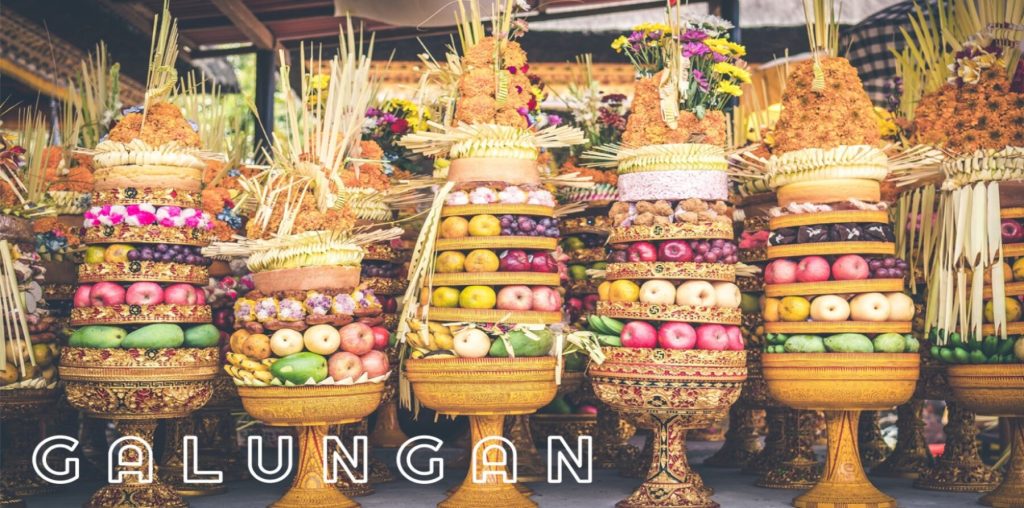Galungan – One of the most important holidays in Bali

Throughout the year, the Balinese calendar is filled with numerous religious celebrations and the Balinese are keen to keep their traditions alive. One of the most important marks in the Balinese year is Galungan, which is celebrated every 210 days by the Hindus on the island. In 2021, the holiday falls on the 14th of April. Learn more about the meaning of this special holiday and how we celebrate it here at Udara in our blog post.
The meaning of Galungan
Galungan day honors the creator of the universe (Ida Sang Hyang Widi) and celebrates the victory of good above the evil (dharma over adharma). It reminds the people to live a virtuous life, which is guided by the higher self instead of being driven by the ego.
The Balinese believe that the deceased ancestors revisit their home on earth during this time, where they are welcomed by their relatives with prayers and offerings. On Kuningan day, at the end of the 10 days’ festive period, the spirits leave the earthly realm again.
Celebrations and Offerings
The festivities begin with decorating and putting up large bamboo sticks (penjor) on the streets in front of the houses. They are beautifully ornamented with natural material such as coconut leaves and flowers, and supplied with various offerings like fruit and rice cakes. In some villages, the penjor are kept outside for a whole month and make a wonderful opportunity for scenic pictures.
The merry holidays are characterized by temple ceremonies, communal activities and family visits. The families are busy preparing offerings for their homes and temples, cooking traditional Balinese foods such as lawar and yellow rice and travelling across the island to visit their family and close friends. Galungan and Kuningan are national holidays, yet most Balinese Hindus will try to take a few more days off work in order to fulfill their duties during the festivities.
The Celebration of Galungan at Udara and in Seseh
Some days before Galungan, our local team members gather to prepare a beautiful penjor to decorate the entrance of Udara and give reverence to this special day. On Galungan day, the staff members who follow the Hindu Agama religion bring offerings to our house temple and take time for prayer.
In Seseh, the local families pray and give offerings in their house temples and shrines and go to each temple in the village on Galungan morning to worship the Gods and ancestors. Very often, the ceremonies are accompanied by dances and gamelan music. In Seseh, this will take place at the Pura Ulun Swi temple, close to Udara, two weeks after Kuningan. On this event, members of the village community dress up and dance as Barong (a mystical dragon) and Rangda (a demon queen) to parade the streets, accompanied by the hypnotizing sounds of the traditional Gamelan music.
As a guest at Udara, you are very welcome to join the celebrations. The Galungan holidays are a beautiful opportunity for visitors to dive deeper into the cultural heritage of Bali and interact with the local community. The Balinese are very welcoming and it is very likely that you will be invited to join a temple ceremony and receive some fruit and cakes from the offerings.
Our staff members are always open to share about their experiences, beliefs and culture. Adi Prasteya, hotel manager, who was raised both in the Buddhist and Hindu tradition remembers his excitement as a kid for the Galungan holiday to come up. Similar to western Christmas presents, the Balinese children would get a holiday allowance from their parents and uncles. Ari Damini, head of Spa, loves the cheerful atmosphere of this holiday to bring all family members closer together. Yet this year, she tells that the celebrations will feel quite different because of the Covid restrictions and physical distancing protocols. Nevertheless, she is faithful and believes firmly in dharma. “I keep faith that God will lead us in passing through this situation. Let us all pray for one silent minute on Galungan day, to put our ego aside, not only to pray for ourselves but for the healing of the entire universe”, Ari says.
Archives
- Art of Pause
- HBOT
- Change your mind- change your life
- Tibetan singing bowl
- importance of relaxation
- Ecstatic dance
- Rituals and ceremonies
- Sound healing – medicine of future
- 5 Top tips to strengthen immune system
- How to stay positive in challenging times
- Our gut – fundation of health and wellbeing
- Jamu
- Water healing
- Why a retreat?
